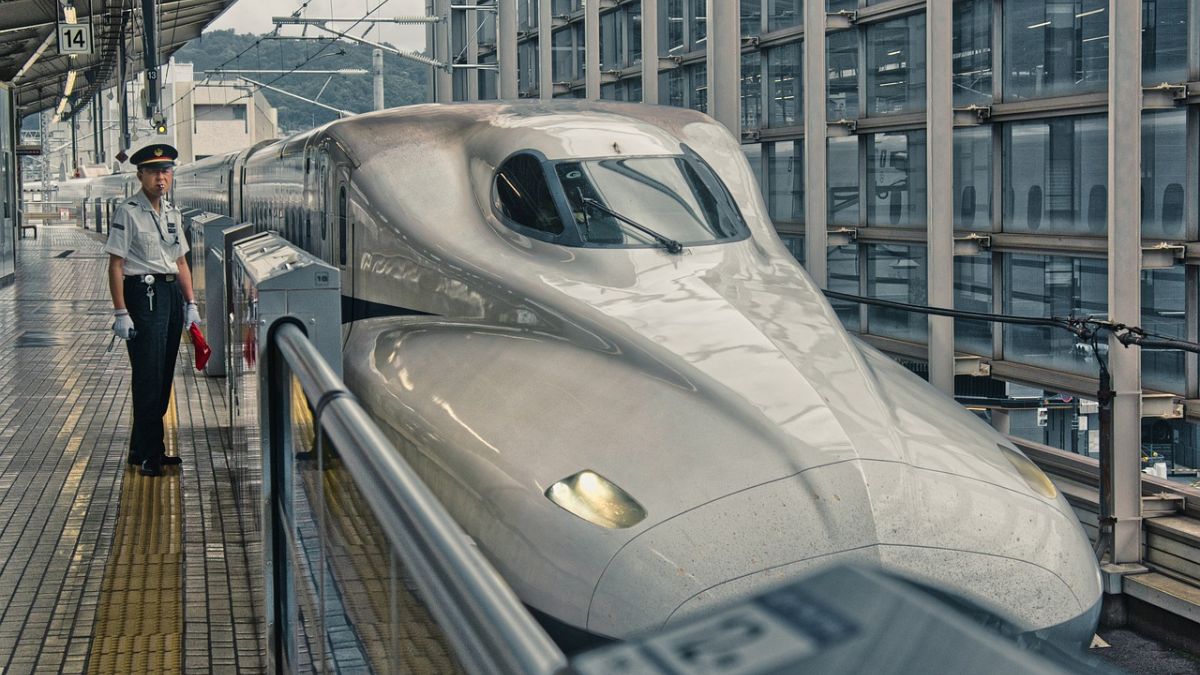Following a wave of violent knife attacks, Japan has introduced a rather unconventional measure to enhance public safety on trains—stab-proof umbrellas.
Thousands of these specially crafted, blade-resistant umbrellas are set to be deployed in over 600 trains in Japan to serve as a portable shield for passengers against potential threats.
But what exactly are these stab-proof umbrellas, and why have Japanese trains become a target for knife attacks in recent years? Here’s a closer look.
A canopy of safety
West Japan Railway Co, better known as JR West, has unveiled the new safety equipment during a press conference held at the company’s Osaka headquarters on Thursday.
According to The Strait Times, these umbrellas measure about 1 metre in length, with a diameter of 1.1 metres when fully opened. Covered in a special material that is challenging for blades to cut, the opened umbrella can help guard the holder from being slashed.
The design also features a 20 cm longer extension than standard umbrellas, allowing users to create distance between themselves and an assailant.
A JR West official explained to Japanese daily Mainichi, “The protective shields we’ve used so far were heavy and for close-range use. We’ve now developed something lighter and easier for female employees to handle.”
Weighing just 700 grams, these umbrellas are significantly lighter than traditional shields or other protective tools, such as the ‘sasumata’—a forked polearm used during a failed robbery in Tokyo last year. The compact design makes them suitable for the confined spaces of train carriages, where bulkier gear proves difficult to manoeuvre.
Moreover, the umbrellas are equipped with a meshed fabric, allowing the user to see through and monitor the assailant while staying protected, reported The Strait Times.
JR West president, Kazuaki Hasegawa, emphasised the versatility of the umbrellas, noting, “They can be operated inside a train carriage and are durable. In emergencies, we want the crew to respond quickly and ensure passenger safety."
Starting in November, JR West plans to deploy 1,200 of these umbrellas across 600 trains running on conventional lines in the Kansai region, which includes Osaka and Kyoto. Each train will have two umbrellas stored in crew cabins.
“We’ll make additional efforts to improve the safety of our passengers ahead of next year’s Osaka-Kansai Expo,” a JR West official said.
Earlier, the railway operator had equipped some of its trains with protective equipment such as shields, stab-resistant vests, and stab-resistant gloves, but then they focused on developing an umbrella that would be easier to use.
Knife attacks on the rise in Japan
While Japan is renowned for its low crime levels, a recent wave of unprovoked knife attacks has left authorities on edge.
In July 2023, a man launched an attack aboard a JR West train bound for Kansai International Airport in Osaka. Out of the 150 passengers, three were injured, including the driver who attempted to stop the assailant.
This was not an isolated incident. In October 2021, 26-year-old Kyota Hattori went on a violent spree on a Tokyo train. Dressed as the Joker, the villain from Batman movies, Hattori’s assault left 10 injured, and he was later sentenced to 23 years in prison for attempted murder and arson.
Hattori’s attack drew inspiration from a similar incident on the Odakyu Line in Tokyo two months earlier, where Yusuke Tsushima, injured 10 people with a knife. Tsushima claimed his motive was rooted in loneliness, stating that he couldn’t find friends or a girlfriend.
According to South China Morning Post, Japan has faced other grim knife attacks in recent history.
In 2016, a man named Satoshi Uematsu carried out the deadliest mass stabbing in Japan’s history, killing 19 and injuring 26 at a care facility for the mentally disabled in the city of Sagamihara.
Earlier, in 2001, a man stormed an elementary school in Osaka, killing eight children and injuring 15 more. In 2008, a man drove a truck into pedestrians in Tokyo’s Akihabara district before stabbing bystanders, killing seven people.
Despite the rarity of such events, the rise in unprovoked stabbings has prompted authorities to seek innovative ways to protect the public, including the introduction of stab-proof umbrellas on trains.
With input from agencies


)

)
)
)
)
)
)
)
)



